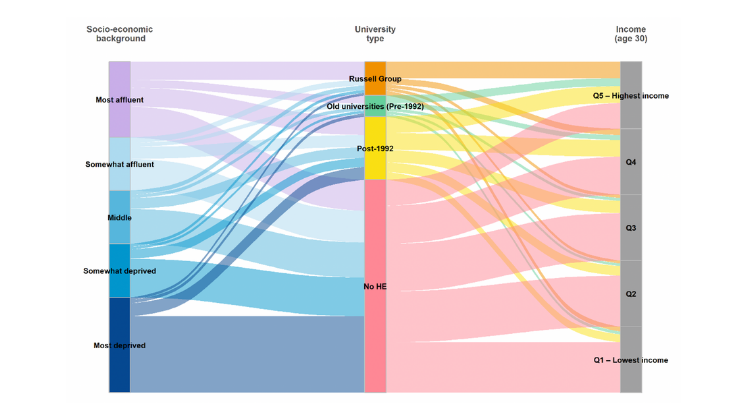Funding for Research Development and Innovation and the aim of the government to ‘level-up’ the UK and improve productivity are closely linked. However, Adrian Webb argues in its current form these investments often work against this agenda, a state of affairs that requires a renewed focus on the impact of these funds and how they are distributed.
Whichever party is in government in a few years’ time, economic growth will be a top priority. And, economic levelling up will be essential to achieve anything like a leading G7 level of growth; the southeast of England cannot close that gap alone. Current thinking emphasises physical infrastructure – and “shovel ready” projects will be key in the short-term. However, only geographically well distributed investment in Research Development & Innovation (RD&I) can deliver sustained levelling up in economic activity, incomes and productivity throughout the UK.
In his New Year speech the Prime Minister implicitly recognised that investment in RD&I (to which must be added skills) are essential to address the UK’s chronic problem of low economic productivity. He celebrated the government’s additional funding for the UKRI (the UK Research, Development and Innovation funding body), but said nothing about how it will be distributed across the UK – nor about the research income lost because of Brexit.
Kier Starmer has side-stepped the currently debased coinage of “Levelling Up” by promising a redistribution of power away from London to the Nations, English Regions and local communities of the UK. He is surely right that our creaking system of representative democracy can only be rescued by expanding local agency and participative democracy. But, while his political vision was clear, his preferred route to inclusive economic regeneration was not. His list of powers to be devolved made no mention of RD&I.
the existing concentration of public RD&I investment in southern England and specifically in the “golden triangle” of London, Oxford and Cambridge, cannot possibly make economic sense
In their detailed analysis of the binding constraints on regional economic growth in the UK, Stansbury, Turner and Balls not only identified investment in RD&I as significant, but noted that the UK distribution of public and higher education R&D investment “may be making regional inequalities in R&D worse”: noting that while comparable “German public sector and higher education R&D to some extent counterbalance regional economic inequality in business R&D spending”, in the UK those expenditures “exacerbate regional economic inequalities even more than business R&D does” (p.37). They also argue that patterns of business investment in R&D suggest an absorptive capacity in some regions that is not being matched by public R&D investment.
In short, the existing concentration of public RD&I investment in southern England and specifically in the “golden triangle” of London, Oxford and Cambridge, cannot possibly make economic sense. The only serious redistribution of resources – including RD&I investment – to some of the most left-behind of the UK’s nations, regions and communities was the distribution of EU structural funds, which was swept away by Brexit and replaced by a centralised UK competitive process.
The significance of this little remarked upon unintended consequence of Brexit has been quantified in Wales by the independent Reid Review, which proposed additional RD&I funding of £90m/annum and a further £100m/annum if the promised compensation for the loss of EU funding did not automatically flow into Wales, which it did not. But, these sums were merely to reduce Wales’ substantial RD&I disadvantage by increasing its capacity for grant capture in the competitive UK RD&I funding system; they were not about closing the economic growth and productivity gap between Wales and the rest of the UK.
This problem is UK wide – and it exists at sub-regional and local level, not just across the nations and regions. Manchester’s “Atom Valley” project aims to create what is needed in many local economies: locality specific investment in Mode 2 (applied) R&D and stronger links between businesses, communities and universities (and matching investment in Further Education and the skills base). If investment in RD&I is to be at the heart of any serious approach to economic levelling up, areas of economic disadvantage ideally need an RD&I advantage not merely a reduction of existing disadvantage.
Following the logic of Kier Starmer’s redistribution of powers, all RD&I funding would be devolved to the nations and regions – and thence into community-based regeneration. To do so would cause an uproar. It would mean radically reducing the concentration of funding long seen as essential to the UK’s international research reputation; it would be seen as a levelling down not levelling up. The alternative would be to create for all the nations and regions of the UK the “twin-track” RD&I funding delivered to some areas by membership of the EU: a UK competitive system matched by a devolved system. But even the increasing level of current public investment in RD&I is insufficient to fund both the existing concentration on the South-East and a better distribution of investment in RD&I-led regional innovation and growth. There needs to be a degree of redistribution, or a further substantial increase in public funding – or a combination of the two.
If investment in RD&I is to be at the heart of any serious approach to economic levelling up, areas of economic disadvantage ideally need an RD&I advantage not merely a reduction of existing disadvantage.
Careful attention to the scale and distribution of RD&I investment is also merited by the imbalances in the supply and demand (or need) for different types of knowledge generation. The gap between supply and demand in the provision of effective heath care speaks to the need for imagination, experimentation and growth in both preventive health programmes and adult social care, for example. But while a focus on technological innovation is understandable, it masks an increasing need for social innovation. A state of affairs Jones and Wilsden argue concentrates RD&I in a “biomedical bubble” that squeezes out work on alternative perspectives.
The opportunity costs of current levels and patterns of RD&I investment must not be ignored and left unattended. The same might be said for the existing patterns of knowledge exploitation – by region, topic, actor and outcome. Both the Prime Minister and Keir Starmer are cautious about “loosening the Treasury’s cheque book”, but greater and/or better distributed investment in RD&I across the UK must be at the forefront of increasing productivity, incomes and thereby the tax base on which public investment of all kinds depends. The issue of RD&I funding needs to be moved up the political – and Treasury – agenda.
The content generated on this blog is for information purposes only. This Article gives the views and opinions of the authors and does not reflect the views and opinions of the Impact of Social Science blog (the blog), nor of the London School of Economics and Political Science. Please review our comments policy if you have any concerns on posting a comment below.
Image Credit: Jonny Gios via Unsplash.








